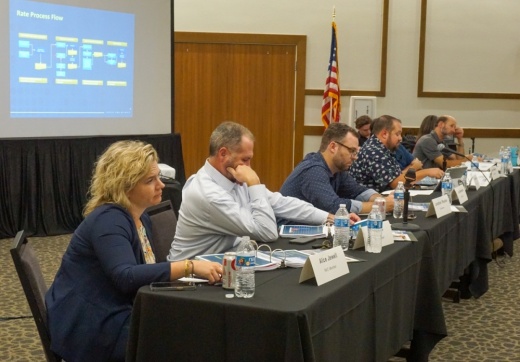The New Braunfels Utilities Rate Advisory Committee held its second of six meetings Aug. 10 since being appointed by NBU officials on April 28.
The Rate Advisory Committee consists of 18 members appointed by the NBU Board of Trustees, seven of which are nominated by each member of the New Braunfels City Council.
The committee received a presentation on NBU’s water and wastewater cost-of-service study from Richard Campgell, financial services director of consulting firm Freese & Nichols. Managing Director of Energy Practice Tony Georgis with subconsultant NewGen Strategies & Solutions also gave a presentation on their findings in their electric cost-of-service study.
The purpose of the Advisory Committee is to ensure NBU maintains fair and equitable rates based on the cost of providing service to its customers, according to NBU. Committee members will meet throughout 2022 and early 2023 as NBU completes the cost-of-service and rate design study before presenting a new rate plan to City Council in April 2023.
Multiple public speakers asked the board to suspend the utility rate increase that was put into place on Aug. 1, due to the high bills customers have been charged during the summer months and with the Power Cost Recovery Adjustment, or PCRA, charge.
Comal County resident Jim Holster spoke during the public comment period and asked for the Rates Advisory Committee to create a subcommittee in order to get more feedback from the community.
The committee also heard from city residents asking for more explanation on rates.
“I have felt like, over the past several months, [NBU has] been lacking transparency and clarity as it relates to what our rates entail,” said New Braunfels resident Regina Manfredi, who also spoke during the public comment period.
The study will analyze whether the current rate structure will provide sufficient total revenue for NBU to deliver services the next three years. The Utility Rate Setting Goals include calculating the costs to provide utility service and equitably recover those costs from customers in rates, and to develop a rate strategy that aligns with NBU’s long-term goals while maintaining financial stability.
Additionally, the cost-of-service study will be analyzed to determine if cost allocations are fair and equitable among the customer classes, like residential and commercial accounts, according to the presentation. NBU’s practice has been to try to have each customer class support its own cost of service.
Resident support
According to the presentation, NBU is considering a new approach to support low or fixed-income customers. Currently, residential customers who qualify receive assistance from the New Braunfels Food Bank.
There is also a low-income discount that has assisted 110 customers since August 2021, in which customers receive a $3 discount monthly on water or sewer charges, up to $166K per year. The utility bill assistance budget is $250K per year, allocating up to $900 of assistance on a customer’s bill per year.
The rates shown on utility bills should be simple to understand and easy to implement, the presentation states. NBU Chief Executive Officer Ian Taylor said their bills are not easy enough to understand for customers currently, and they are working on finding solutions.
Some of the questions asked by the consulting firms during the presentation included whether NBU should set rates to fully recover the projected revenue requirements needed to fund operations and capital, as well as whether infrastructure growth or system expansions should be fully carried by the customers driving the growth or balanced between existing utility customers and the new customers.
Also on the topic of NBU accommodating growth, the consulting firms asked if economic development should be considered in rate making or attraction of new larger commercial customers. Currently, “NBU’s Board has indicated that they feel growth should pay for growth, if at all possible” the presentation stated.
NBU officials also said in the presentation that their practice has been to have each line of business be self-sufficient, and they have bond covenants they must maintain. NBU has a financial policy in place with specified parameters that they must maintain, including having a contingency fund at 90 to 120 days of operating expenses.
The committee's next meeting is scheduled to take place on Sept. 14 at 3 p.m. in the Civic Center Ballroom, located at 375 S Castell Ave., New Braunfels.





